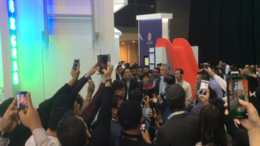Monetary Authority of Singapore
 Logo of MAS | |
| Headquarters | 10 Shenton Way, MAS Building, Singapore 079117 |
|---|---|
| Established | 1 January 1971 |
| Ownership | 100% state ownership[1] |
| Chairman | Tharman Shanmugaratnam |
| Central bank of | Singapore |
| Currency | Singapore dollar SGD (ISO 4217) |
| Reserves | US$273.1 billion[2] |
| Bank rate | 1.67%[3] |
| Website | http://www.mas.gov.sg |
| Agency overview | |
|---|---|
| Formed | 1 January 1971 |
| Preceding agency |
|
| Jurisdiction | Government of Singapore |
| Headquarters | 10 Shenton Way, MAS Building, Singapore 079117 |
| Minister responsible |
|
| Agency executive |
|
| Parent agency | Prime Minister's Office |
| Website | www |
The Monetary Authority of Singapore (Abbreviation: MAS) is the central bank and financial regulatory authority of Singapore. It administers the various statutes pertaining to money, banking, insurance, securities and the financial sector in general, as well as currency issuance. It was established in 1971 to act as the Singapore Government's banker.

History
The MAS was founded in 1971 to oversee various monetary functions associated with banking and finance. Before its establishment, monetary functions were performed by government departments and agencies. The acronym for its name resembles mas, the word for 'gold' in Malay, Singapore's national language – although it is not pronounced in the same way.[4]
As Singapore progressed, an increasingly complex banking and monetary environment required more dynamic and coherent monetary administration. Therefore, in 1970, the Parliament of Singapore passed the Monetary Authority of Singapore Act leading to the formation of MAS on 1 January 1971. The act gives MAS the authority to regulate all elements of monetary policy, banking, and finance in Singapore.
During the COVID-19 pandemic MAS brought forward its twice yearly meeting from some time in April to 30 March.[5] The MAS decided to ease the Singapore dollar's appreciation rate to zero percent, as well as adjust the policy band downwards, the first such move since the Global Financial Crisis. This makes it the first time the MAS had taken these two measures together.[6]
List of Chairmen
- Hon Sui Sen (Jan 1971 - Jul 1980)
- Goh Keng Swee (Aug 1980 - Jan 1985)
- Richard Hu (Jan 1985 - Dec 1997)
- Lee Hsien Loong (Jan 1998 - Aug 2004)
- Goh Chok Tong (Aug 2004 - May 2011)
- Tharman Shanmugaratnam (May 2011 - )
Policy
MAS regulate Singapore's monetary system via the foreign exchange mechanism, managing the Singapore dollar versus an undisclosed number of currencies, creating a Singapore dollar nominal effective exchange rate (S$ NEER) since 1981 instead of via interest rates like other central banks such as Federal Reserve System or Bank of England. It carries this out by intervening in the SGD market as well as other operations in the money market.[8][9] The MAS reviews its policy stance less frequently than most central banks, in a cycle that is around every 6 months.[10]
Issuing Banknotes and Coins
Following its merger with the Board of Commissioners of Currency on 1 October 2002, the MAS assumed the function of currency issuance.
MAS has the exclusive right to issue banknotes and coins in the Republic of Singapore. Their dimensions, designs and denominations are determined by the Monetary Policy Committee with Government approval. The banknotes and coins thus issued have the status of legal tender within the country for all transactions, both public and private, without limitation.
In December 2020, MAS approved digital bank licenses for 4 tech giants, Grab-Singtel consortium, Ant Group, Sea Group, and Greenland Financial consortium.[11] Grab-Singtel and Sea Group were awarded digital full banking licenses, while Ant Group and Greenland Financial were awarded digital wholesale banking licenses.[12]
Singapore FinTech Festival

MAS organises the Singapore FinTech Festival (SFF) annually in partnership with The Association of Banks in Singapore and in collaboration with SingEx Holdings. SFF is a FinTech festival to connects the various FinTech communities around the world to interact with each other.[13]
See also
References
- ^ https://d-nb.info/1138787981/34
- ^ "The World Fact Book - Singapore". Central Intelligence Agency. Retrieved September 17, 2014.
- ^ "Domestic Interest Rates". Monetary Authority of Singapore. Retrieved 27 July 2019.
- ^ Adam Brown (1999). Singapore English in a nutshell: an alphabetical description of its features. Federal Publications. ISBN 978-981-01-2435-9.
- ^ "MAS brings forward monetary policy statement, firming easing bets". CNA. Retrieved 2020-04-06.
- ^ hermesauto (2020-03-30). "MAS eases Singdollar policy in measured move as economy braces for recession". The Straits Times. Retrieved 2020-04-06.
- ^ "Singapore's Exchange Rate-Based Monetary Policy". Monetary Authority of Singapore. Monetary Authority of Singapore. 2013. Archived from the original on 19 April 2013. Retrieved 18 April 2013.
- ^ "Singapore's Unique Monetary Policy". IMF eLibrary. Retrieved 2020-04-10.
- ^ "Singapore's Exchange Rate-based Monetary Policy" (PDF).
- ^ hermesauto (2020-12-04). "Singapore to have 4 digital banks, with Grab-Singtel and Sea getting digital full bank licences". The Straits Times. Retrieved 2020-12-07.
- ^ "Grab-Singtel, Sea, and Ant Group can now run Digital Banks in Singapore". BEAMSTART - Bridging Global Opportunities. Retrieved 2020-12-07.
- ^ "Singapore FinTech Festival". Monetary Authority of Singapore. Retrieved July 28, 2020.
